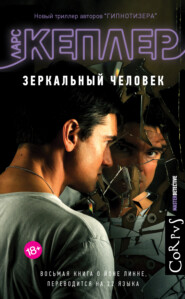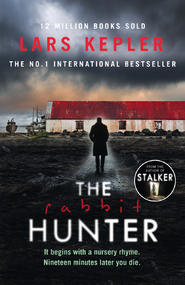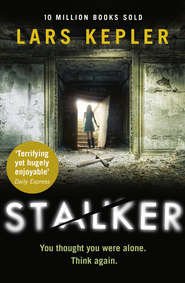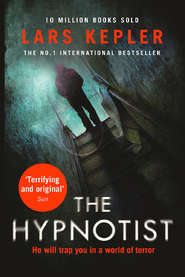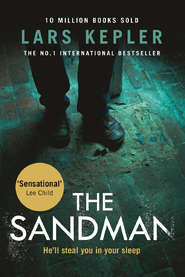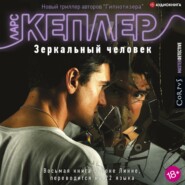По всем вопросам обращайтесь на: info@litportal.ru
(©) 2003-2024.
✖
Joona Linna Crime Series Books 1 and 2: The Hypnotist, The Nightmare
Настройки чтения
Размер шрифта
Высота строк
Поля
“Do you think Benjamin has started playing again?” asks Kennet.
“Not in the same way. This must be something else,” she says, pointing at the screen.
“You think this Wailord is a real person,” he says.
“Yes.”
“Who has nothing to do with Pokémon?”
“I don’t know … Aida’s brother talked to me about Wailord as if he was talking about a Pokémon. Perhaps that’s just his way of talking. As I said, he’s a little … off. But everything is cast in a different light when Benjamin writes Don’t let Nicky go down to the sea.”
“It does sound as if Benjamin’s taking the threat seriously,” says Kennet.
“But the sea,” she says. “What sea? There is no sea here, it only exists in the game. The sea is pretend, but the threat is genuine,” she says thoughtfully.
“We have to find this Wailord.”
“It could be a Lunar,” she says hesitantly. “Or an Avatar, or something.”
He looks at her with a small smile. “I’m beginning to understand why it was time for me to retire.”
“Lunar is an identity on a chat page,” Simone explains, moving closer to the screen. “I’ll do a search for Wailord.”
The result gives 85,000 hits. Kennet goes into the kitchen, and she hears the sound of the police radio being turned up. Crackling and hissing is mixed with human voices.
She skims through page after page of Japanese Pokémon material.
Wailord is the largest of all identified Pokémon up to now. This giant Pokémon swims in the open sea, eating massive amounts of food at once with its enormous mouth.
“There’s your sea,” says Kennet quietly, reading over her shoulder.
She didn’t hear him come back.
The text describes how Wailord chases its prey and herds them by making a gigantic leap and landing in the middle of the shoal. It is terrible, Simone reads, to see Wailord swallow its prey in one gulp.
She refines the search by requesting only pages written in Swedish and enters a forum where she finds a conversation:
Hi, how do you get a Wailord?
If you want to get a Wailord, the easiest thing is to catch a Wailmer somewhere out at sea.
OK, but where?
Almost anywhere, as long as you use Super Rod.
“Anything useful?” asks Kennet.
“This could take a while.”
“Go through all his messages, check the trash, and try to track down this Wailord.”
She looks up and sees that Kennet has his leather jacket on.
“I’m off,” he says briefly.
“Off where? Home?”
“I need to talk to Nicky and Aida.”
“Shall I come with you?” she asks.
Kennet shakes his head. “It’s better if you’re the one who goes through the computer.”
Kennet tries to summon up a smile as she walks to the door with him. He looks very tired. She gives him a hug before he goes, locks up behind him, and hears him press the button for the lift.
She walks into the kitchen and sees a brioche sitting on the flattened paper bag it came in, a slice cut from it. The coffee machine is still on, but there is only a dark sediment in the bottom of the pot.
The smell of burnt coffee mingles with a sense of panic over the feeling that her life has been divided into two acts and that the first act, the happy one, has just ended. She can’t bring herself to think about Act Two. Outside the window lies the December darkness. It looks windy. The traffic signals, suspended over the junctions, swing back and forth, and wet snowflakes are falling through the light.
She finds a deleted message from Aida: I feel sorry for you, living in a house of lies. The message has a large attachment. Simone feels the pulse at her temples beating faster. Just as she is about to click open the file, there is a tentative knock at the front door. It is almost a scraping sound. She holds her breath, hears another knock, and stands up. Her legs feel weak as she begins to walk down the long passage leading to the hall and the outside door.
57
sunday, december 13 (feast of st lucia): afternoon
Kennet sits in his car outside the entrance to Aida’s apartment in Sundbyberg, pondering the strange threat on Benjamin’s computer:
Nicky says Wailord is angry, and that he has opened his mouth against you.
And Benjamin’s response:
Don’t let him go down to the sea.
Kennet thinks about the number of times in his life when he has both seen and heard fear. He himself knows how fear feels, because none of us walks without it.
The building where Aida lives is quite small, only three storeys. It looks unexpectedly idyllic, old-fashioned and authentic. He looks at the photo Simone gave him. A girl with piercings, her eyes heavily made up with black. He wonders why he finds it difficult to imagine her living in this building, eating at a kitchen table, sleeping in a room where posters of ponies have been replaced by Marilyn Manson.
Kennet gets out of the car and is about to creep over to the balcony he thinks belongs to Aida’s family, but he stops when he catches sight of a tall, shambling figure moving back and forth along the path behind the building.
Suddenly the door opens and Aida comes out. She seems to be in a hurry. She glances over her shoulder, takes a pack of cigarettes out of her bag and shakes one out, tucks it between her lips, and lights it without ever slowing down. Kennet follows her towards the underground station. He will approach her once he figures out where she’s heading. A bus thunders past, and somewhere a dog starts barking. Kennet suddenly sees the tall figure from behind the building rush towards Aida. She turns around to face him, but rather than frightened she’s happy; her whole face is smiling, and the pale, powdered cheeks and kohl-rimmed eyes are suddenly childlike. The figure jumps up and down in front of her. She pats him on the cheek, and he responds with a hug. They kiss the tips of each other’s noses, and then Aida waves goodbye. Kennet moves closer, thinking that the tall figure must be her brother. He is standing motionless, watching Aida as she walks away; then he gives a little wave and turns. Kennet sees the boy’s face, soft and open. One eye has a significant squint. Kennet stops beneath a streetlamp and waits. The boy heads towards him with long, heavy strides.
“Hi, Nicky,” says Kennet.
Nicky stops and looks at him with an expression of terror. There is a blob of saliva at both corners of his mouth. “Not allowed,” he says, slowly and uncertainly.
“Sure you are. My name is Kennet, and I’m a police officer. Or, to be more accurate, I’m getting on a bit now and I’ve retired, but that doesn’t change anything, I’m still a police officer.”
The boy smiles in surprise. “Have you got a gun, then?”






